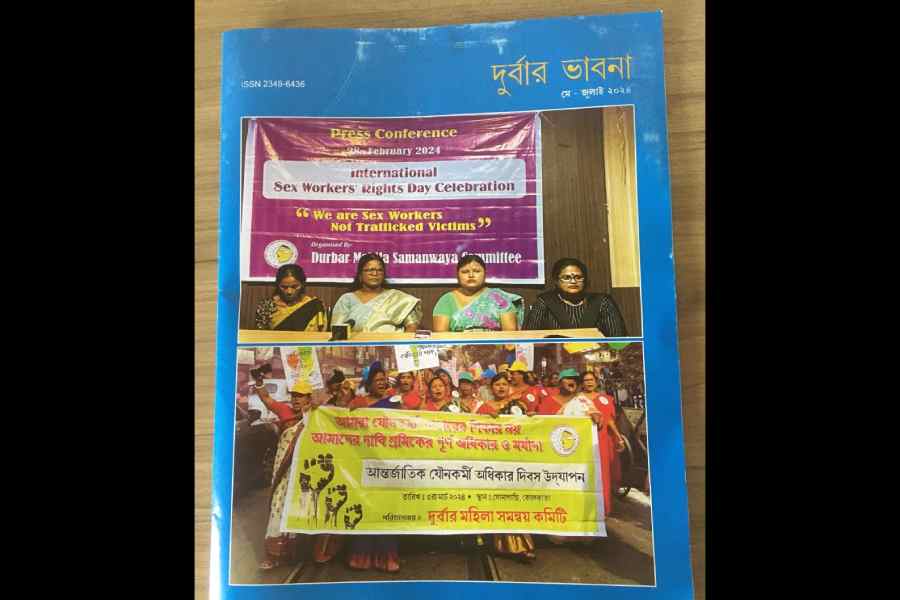A report in Durbar Bhabona, published by the Durbar Mahila Samanwaya Committee, a collective of 40,000 sex workers in Bengal, has its secretary Bishakha Laskar saying that for many sex workers, the profession is voluntary.
Choice may not eliminate difficulty. But it has several implications, for instance, that the women do not feel any guilt for being in prostitution, though society would impose that on them.
Sex work is like any other work, says Laskar, underlining the premise on which her organisation, popularly known as just Durbar, was built.
“Durbar” (the “u” is pronounced “oo”) in Bengali means “unstoppable”. In its journey of three decades, the organisation has been able to create a massive network of sex workers, mostly in brothels, and has been fighting for their rights.
That fight goes on. Elections come and go, as do politicians. “They do visit red-light districts,” says Laskar. But some things do not change.
Sex work should be given the recognition and dignity of a profession, Durbar has been demanding since it was set up in the ‘90s. The organisation has also played a big role in the prevention and control of HIV and sexually transmitted diseases in Sonagachhi and other red-light districts in Calcutta and Bengal.
According to the latest reports, the prevalence rate of HIV and syphilis is now significantly low among vulnerable populations in Bengal.
“Not all of us have been trafficked. We are sex workers and we are working voluntarily,” repeats Laskar, seated at the Durbar office in north Calcutta.
She is happy that Durbar Bhabona has come out again. The magazine has been published after a yearlong break and will now be a quarterly, after having been published uninterrupted as a monthly from 2009 till 2020.
Covid had proved disastrous for the community. The magazine came out sporadically after that.
Durbar Bhabona, like the organisation itself, owes its origin to Smarajit Jana.
A doctor then working with the All India Institute of Hygiene and Public Health, Calcutta, he had visited Sonagachhi in 1992 for a study on HIV.
Following this, he founded the organisation in 1995 with 12 sex workers and remained its mentor till his death in 2021. Durbar did pioneering work in red-light zones in Calcutta and other parts of Bengal in the prevention and control of HIV and sexually transmitted diseases.
As he set up a group, with the help of the Sonagachhi community, to advocate safety in sexual behaviour and the use of condoms, Jana felt it was as important for sex workers to fight for their dignity and recognition as workers. Today, Durbar is run by women from the community.
Laskar challenges the assumption that one can only be compelled by circumstances into being a sex worker.
“Who is not compelled by circumstances?” she asks. How many people enjoy the work that they do? Which profession is not exploitative?
Sex work is not essentially different from other work, she says. One should have the right to choose how to use one’s body, she asserts. “We provide a service.”
Every new entrant into the profession that Durbar knows of is counselled on health as well as money management.
Some things have changed. Recent Supreme Court orders have spoken about sex workers’ rights. In May 2022, the apex court said the police should not interfere or take criminal action against adult and consenting sex workers.
Sex workers are not to be arrested, penalised, harassed or victimised during raids, as voluntary sex work is not illegal — though running a brothel is, the court has said.
The court has directed the government to issue Aadhaar cards, voter identity cards and ration cards to sex workers. “This has been arranged for most of our community members,” says Laskar.
These are all signs of change. “Yet a celebrity, talking about how women dress in indecent ways now, had to give our example, of ‘women who wait under the lampposts’,” says Laskar. This shows how “respectable” society looks at sex workers even now, despite so much conversation about marginalised social identities.
Laskar is also not fully comfortable with the way red-light zones have been portrayed in a few recent films. “Filmmakers should first come and see how we live,” she says.
“We are like anyone else. We are also more decent in the way we dress than many who are not sex workers,” Laskar adds.











